Buyers want and need to trust brands more than ever before. They’re educating themselves and researching online before they buy. Trust is among the top three reasons that drive purchasing decisions, according to the 2023 Edelman Trust Barometer.
Fifty-nine percent of survey respondents said they’re more likely to buy from brands when they trust them, even if they find cheaper products elsewhere. Meanwhile, 67% said they’ll remain loyal to brands and advocate for them, even if the businesses make mistakes.
What does all of this mean? Businesses that prioritize trust have a competitive edge. They also have an opportunity to educate buyers and help them solve problems. Brands can achieve these goals by sharing high-value content that features insights from subject experts.
Why is subject experts’ input so important?
On Edelman’s 2024 authority scale, scientists and technical experts are among the top three groups that people trust the most. B2B buyers know the difference between white papers and drip email campaigns. Similarly, they can detect valuable, helpful content from the dreck artificial intelligence spits out. Brands that create content based on expert contributions establish credibility and depth. Moreover, they improve audience trust. As a result, subject experts’ knowledge and perspectives can help brands create authoritative content that no one else is doing.
Ways to work with subject experts
Before contacting experts, consider how you can best use their expertise to inform your content. Will they write content for you? If not, are they open to giving interviews? Another way they may be willing to provide support is by reviewing your content for accuracy. These are all valid ways of incorporating experts to build buyers’ trust.
Getting experts to commit to audio and video interviews – unless it’s only for transcripts – could be tough. But if you think beyond written content, you can get more mileage from your interviews and increase your website traffic. You can post video interview snippets to your site, promote them on your social media channels, add them to landing pages and tease them in email blasts. With audio, you can create podcasts. When using audio or video transcripts, you can write blog posts, white papers, articles and other content.
Pro tip
You must get experts’ permission before recording interviews for audio or video content. When you contact them, make it clear what you’re planning. Even if you’re going to record them only so that you’ll have transcripts to support your written content, spell that out. It’s common courtesy to set expectations upfront. Keep in mind that you may need to send them permission forms if you plan to share audio or video recordings. Their organizations may require additional permissions.
Get started
Read on to learn about the types of experts, how they can help with content, how to find them and what to know before you contact them.
3 types of subject experts
Experts fall into three categories:
- Internal experts who work at your company
- Customers who are members of your advisory board or are advocates for your business
- External experts who don’t work at your company
Pro tip
No matter which type you plan to contact, you’ll improve your success rate if you establish relationships with them before seeking their help. Imagine your reaction if someone at your company asked you to write a white paper and that was the first time you’d heard from the person. You probably wouldn’t be jumping up and down with enthusiasm.
Cultivate long-term relationships with experts by:
- Commenting on their published research, articles, blog posts and other professional content.
- Sharing articles and content that you think would be of interest to them.
- Attending industry conferences and networking events where they have a visible presence.
- Offering to help them with their projects if you have relevant expertise.
- Introducing them to people in your network who have shared interests.
Internal subject experts
If your business has employees who have specialized knowledge, they could be a great resource for you. Examples include engineers, product line managers and technical field employees. Internal experts may help you:
- Brainstorm topics
- Discover new angles or approaches for subjects you covered previously
- Explain complex concepts
- Reveal unique insights
- Produce complete content
- Co-author content
- Find data and statistics
- Get quotes
- Review and approve content from you and others at your company
How to find internal experts
If you’re not familiar with your company’s subject experts, start by asking other employees for suggestions. Other ways to find them include reviewing the insights and thought leadership pages on your company’s website. Look for those who write or contribute to blogs, articles, product guides and presentations. Additional experts can include:
- Authors of or contributors to original research that your company publishes
- Employees who speak at industry and customer conferences and webinars
- Technical leads who provide training for employees and customers
What to know before you contact internal experts
While it’s smart to check with your internal experts first, working with them isn’t necessarily your best option. Here’s why:
- Perceived bias: Your audience may question whether your experts’ insights are curated to support a foregone conclusion. In other words, they may be skeptical about the content.
- Internal politics: Leadership may want to handpick experts rather than let the most qualified employees participate.
- Job duties: Contributing to buyer-focused content may be beyond internal experts’ responsibilities. If that’s the case, don’t be surprised if you get pushback.
- Time sensitivities: You’ve got deadlines and your experts have theirs. Your sense of urgency may clash with their schedules and workloads.
Given these possible challenges, consider diversifying your list of experts. Furthermore, including other sources will open the door to new topics, insights and content that you might not get otherwise.
Customer advisory boards and advocates
Does your company have a customer advisory board or a successful advocacy program? If so, consider pursuing this expertise. Customers who serve on advisory boards and those who are brand advocates are vested in your company’s success. Customers often have in-depth knowledge that you can tap for white papers, case studies, videos, how-to guides, blogs, webinars and much more. As vocal champions for your business, customer advocates are usually eager to help.
Customers may help you:
- Discover “hidden” topics, such as unique use cases for your products
- Collaborate on content ideas
- Produce complete content
- Co-author content
- Get quotes
How to find advisory board members and advocates
Check with your customer success division to see if your company has an advisory board or customer advocates. Some businesses have dedicated customer advocacy managers. You might have to do some digging, depending on your organizational chart. These responsibilities can be split among multiple departments and roles.
Whoever oversees your advisory board and advocates can help you identify the best customers for your topic. Customer success/advocacy managers track customers’ expertise, the ways they’re willing to help and the projects they’ve supported, among other information.
What to know before you contact advisory board members and advocates
As with internal experts, advisory board members’ and advocates’ input can be seen as biased. But buyers value their feedback and insights about your products and services much more than general marketing messaging. You might also find customers who can speak to high-level topics that you can tie back to your business offerings.
Keep in mind that advisory board members and advocates may be stretched thin if they’re already helping your business. They may be participating in product development, meeting with your prospective customers and speaking about your company at industry events.
External subject experts
If you don’t have internal resources or customer advisory board members and advocates, you’ll need to search outside your business for the right expertise. External sources will help elevate your content and improve objectivity. Above all, subject experts who aren’t on the payroll and don’t use your products and services are perceived as trustworthy.
External experts may help you:
- Discover new angles or approaches for subjects you covered previously
- Explain complex concepts
- Reveal unique insights
- Find data and statistics
- Get quotes
- Review and approve content from you and others at your company
How to find external subject experts
Over the years, I’ve tested several third-party platforms and other options for sourcing experts. Some have been more helpful than others. Newer options include Help a B2B Writer and Qwoted. I haven’t tried Help a B2B Writer, but I’ve used Qwoted. Another option – and probably my favorite – is LinkedIn. Next, I’ll explain how to use Qwoted and LinkedIn to find experts for your content.
Qwoted
Qwoted formed to connect journalists and brands, but marketers can also use the free service to find sources, including subject experts.
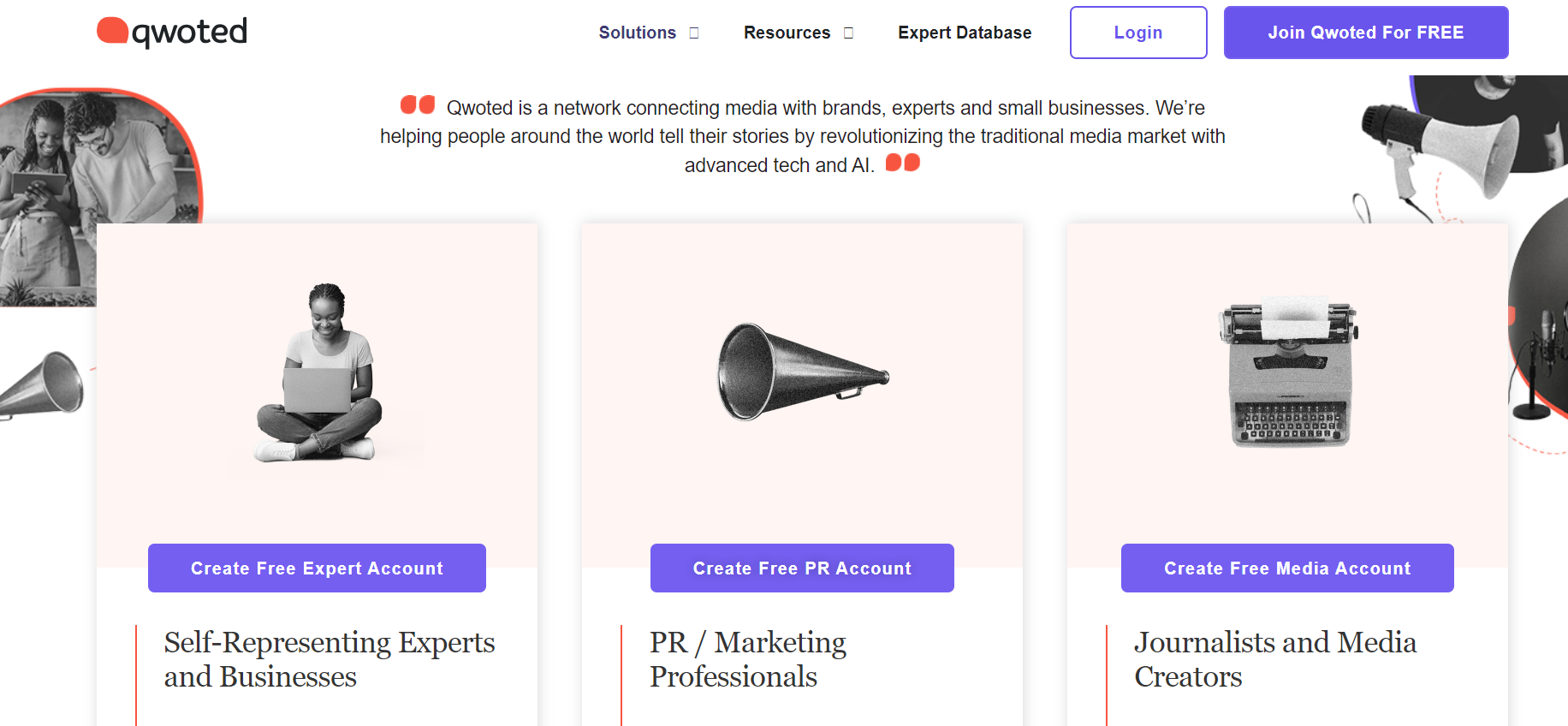
One option is to search Qwoted’s expert database by entering your topic. For example, let’s say you’re writing an article about artificial intelligence (AI). You can narrow your search with filters that include gender, location and title.
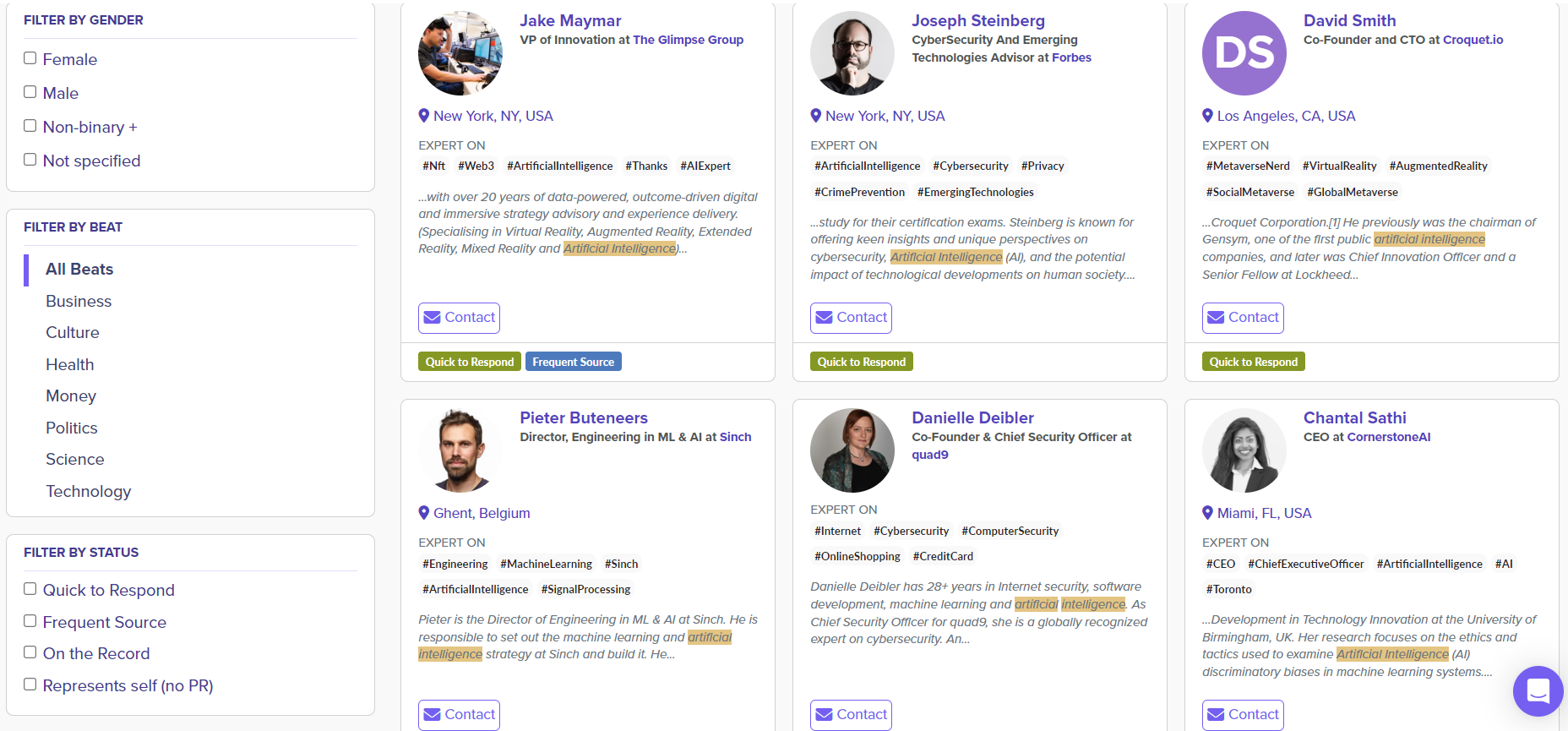
Another way to find sources is to create a request. Specify the kind of expertise you’re looking for, along with other details, and wait for experts to contact you. Note that all queries and responses are through the platform.
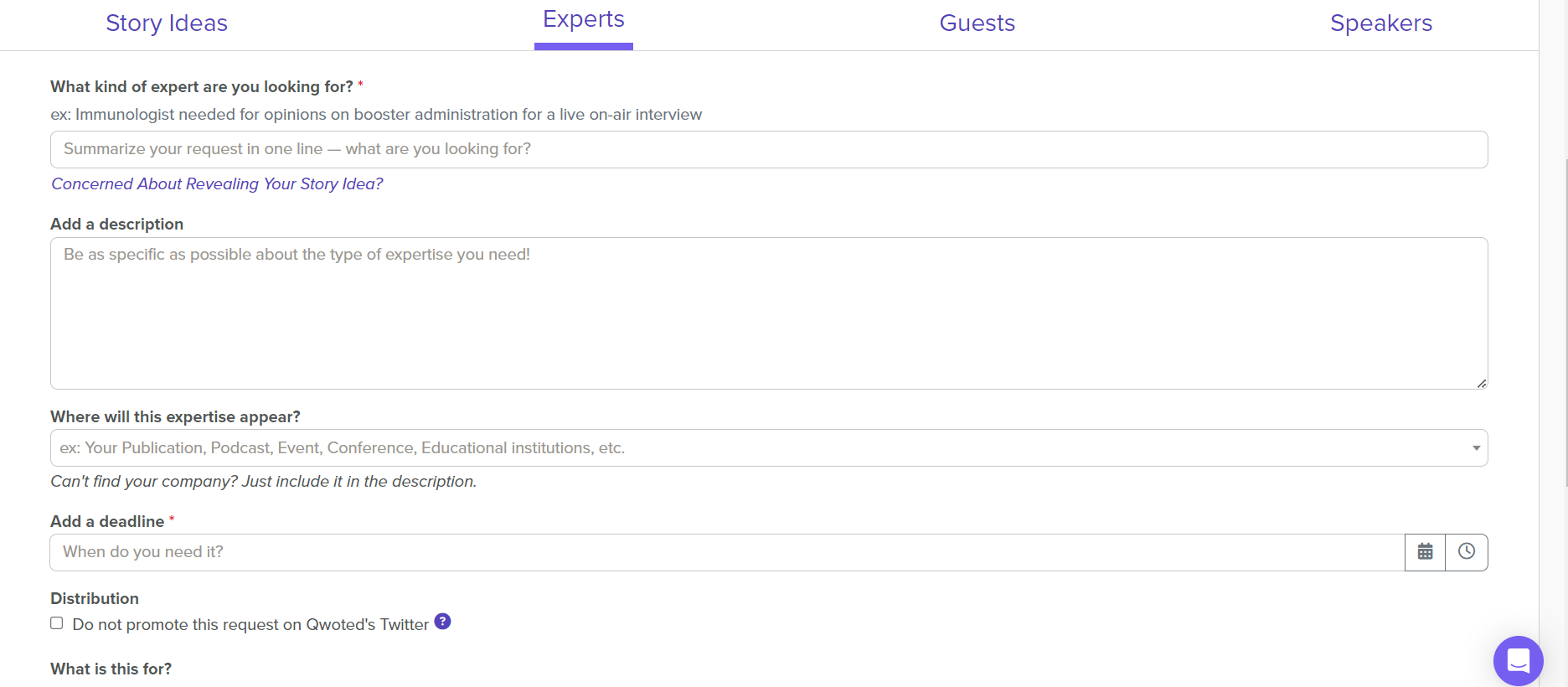
Overall, my experience with Qwoted has been mixed. I haven’t had success using the database, so I’ve relied on requests. Using this approach, I’ve connected with excellent sources and others who seemed questionable.
The questionable sources that contacted me seemed OK initially, but I ended up not using them. Other users later flagged them for responses that were spammy or possibly AI-generated. Here’s what an alert looks like in Qwoted:
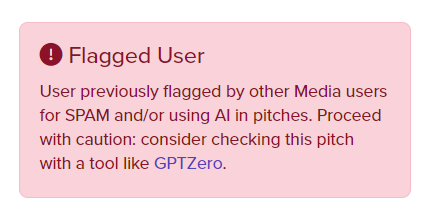
I flagged two out of three sources when they contacted me multiple times for different topics. Each response was basically a copy/paste bio of the individual with no context that tied to my topic. I reported them to Qwoted, as did other Qwoted users. In turn, I received automated responses that stated the service takes these reports seriously and would investigate them. But two months later, both of these sources are in the database without any alerts or flags on their accounts.
After that, a similar situation happened with two other sources who responded to my queries. One sent me a generic bio without any other information. I didn’t respond. The other had multiple alerts from other Qwoted users after I had a mostly positive experience with her. Consequently, they reported her responses as being spammy or AI-generated.
In conclusion, if you use Qwoted’s request feature, scrutinize responses carefully.
Pro tip
To avoid wasting time and effort with potentially spammy sources, I recommend including a qualifier in every Qwoted query. Ask sources to state how their expertise relates to your topic. For example, in the “Add a description window,” add the following to your message:
“In your reply, please state the nature of your expertise that relates to my topic and why you think you’re a good fit.”
If any source doesn’t provide that information, I’d move on. Legitimate experts who genuinely want to help you will include at least a sentence or two.
Your LinkedIn network is another place to find external subject experts. If you don’t have sufficient connections, you can perform searches based on your topic. After logging into your account, enter your topic in the blue search box in the top left corner and select “People.” Here’s an example of a search for customer advocacy experts:
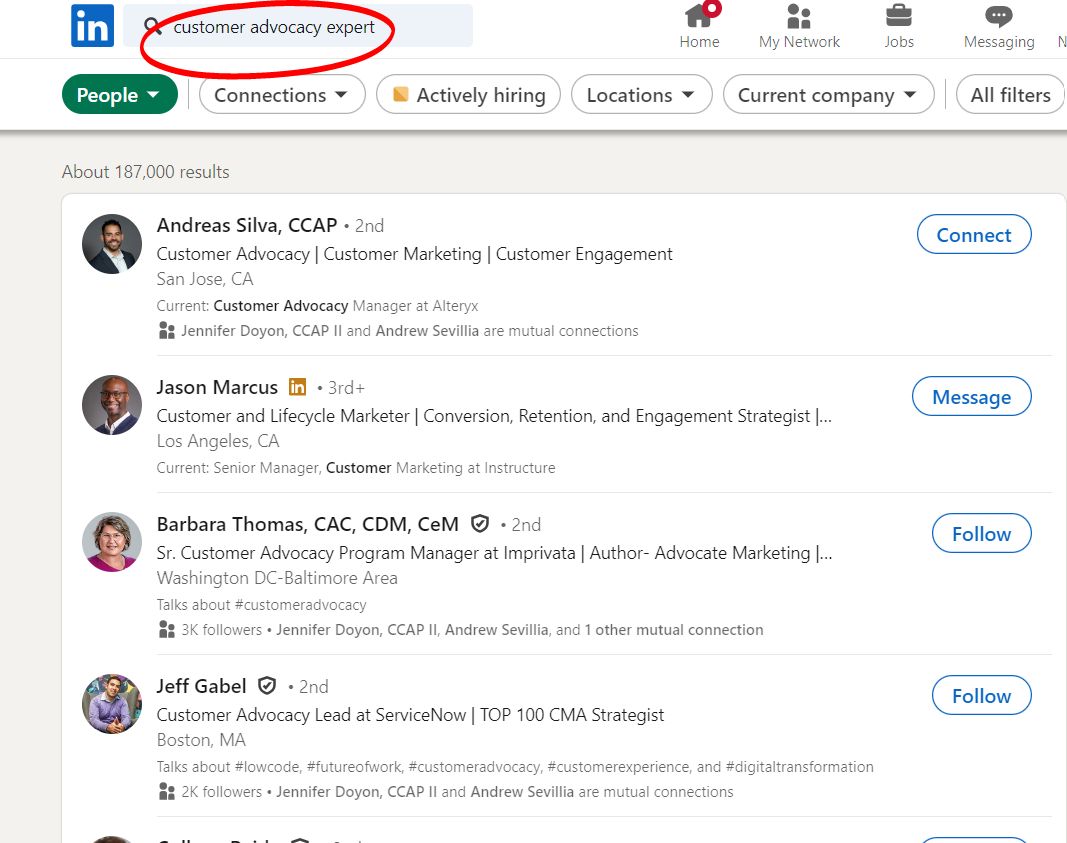
Be aware that you may get thousands of people in your initial search. Next, refine the results by applying filters that include current/past companies, location, “talks about” and keywords, such as skills, interests and certifications. Assuming their profiles are current, review their backgrounds to pinpoint those who meet your criteria.
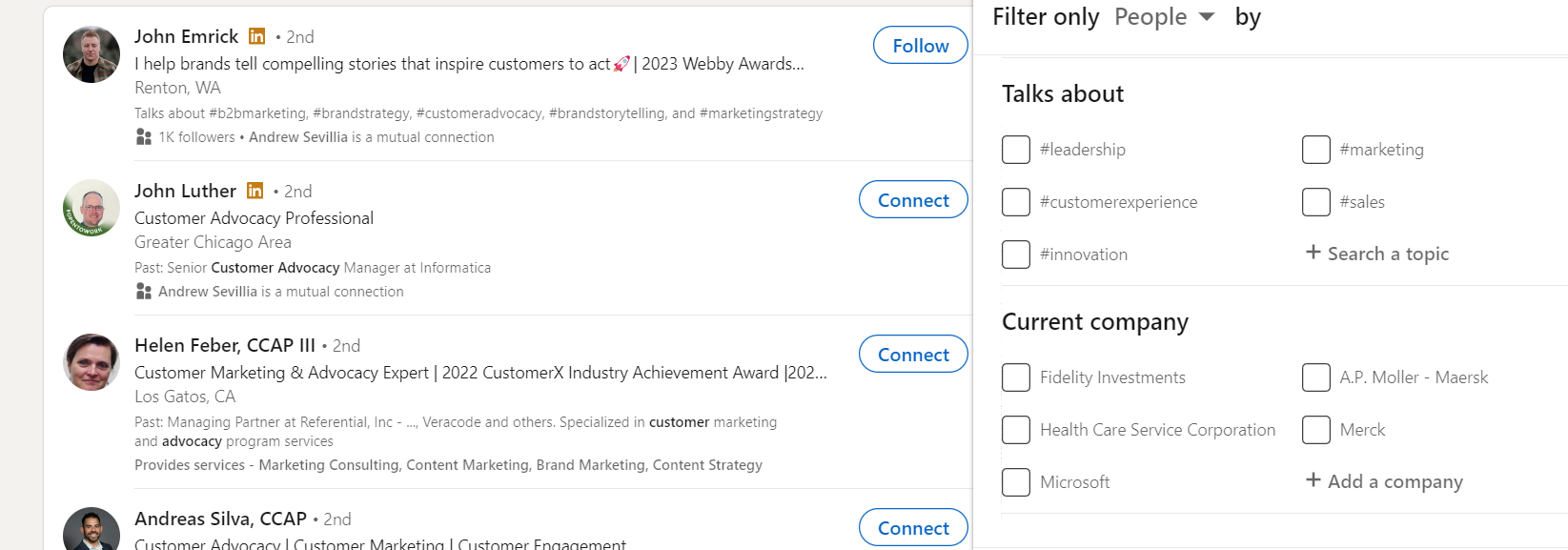
As with any external search, read professional profiles with a discerning eye. If you have any doubts or questions, check for credentials and references to verify a potential source’s expertise. In addition, you can ask for samples of published work, including books, articles, studies and academic papers.
Next, make a list of experts and prioritize them with your top choices first. Include more candidates than you think you’ll use for your content. You’ll lose some through lack of availability, scheduling conflicts, approval hurdles and other reasons. I usually start with six to 10 candidates, but I don’t contact them all at once. I contact the top three or four, and if I don’t hear back, I move to the next batch. I drip my requests because I don’t want to interview 10 experts for one piece of content. It would be overkill and a waste of their time if I didn’t include certain people because their input overlapped.
How to find experts’ email addresses
Getting email addresses is easy using Hunter.io. I’ve had good luck with the tool and my own cross-checking. I recommend doing a little detective work upfront to verify the email addresses the tool provides. In other words, it’s not foolproof.
Let’s say you want an email address for Jan Makela at GE HealthCare. Enter her name and company domain in Hunter’s Email Finder and click “Find.”

The tool didn’t find her email address in public records online. But it found other email addresses for GE HealthCare employees. Click on “See all results” for the complete list.
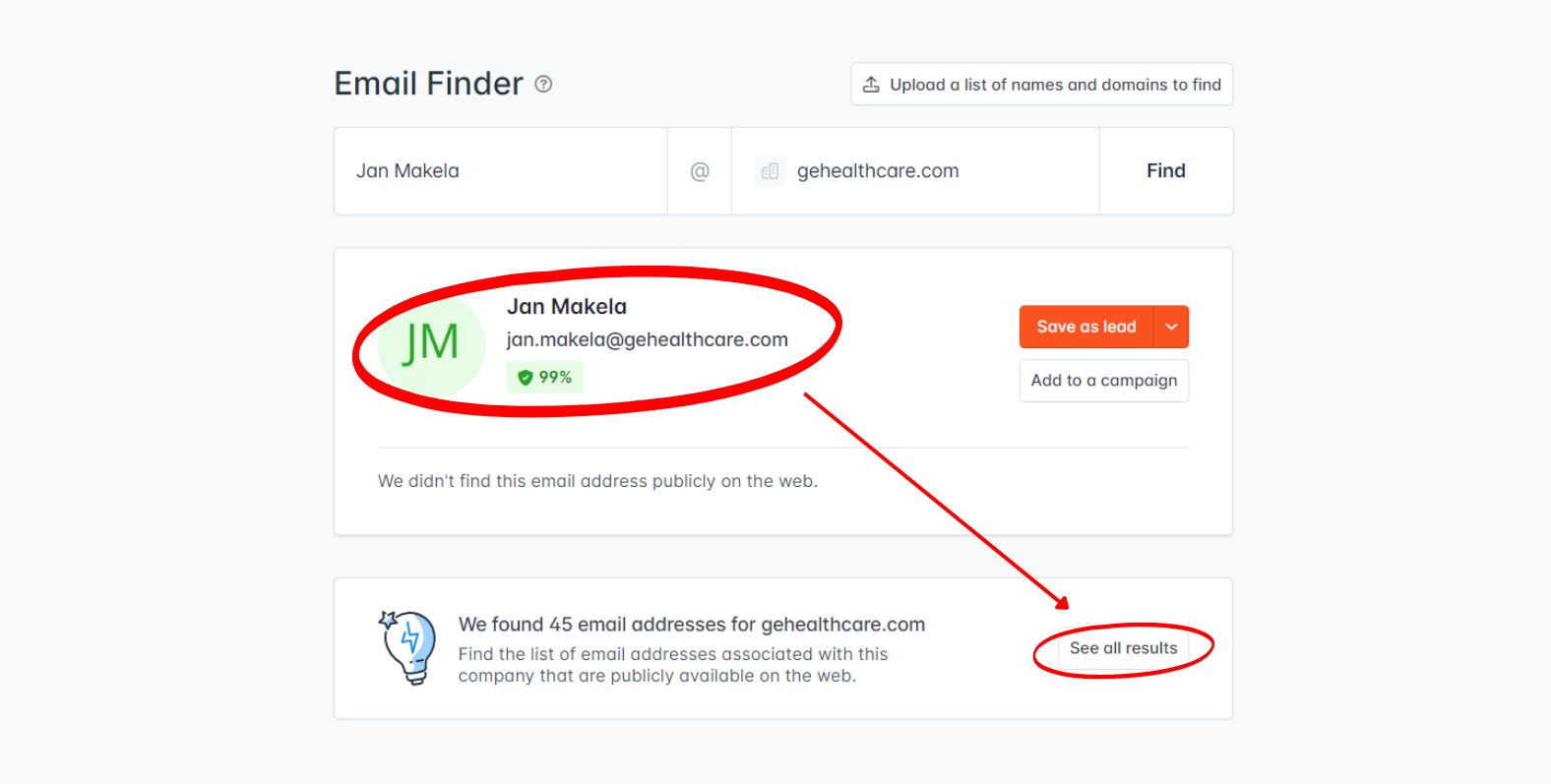
Hunter found 45 results. The tool ranks email addresses at a given domain by percentage of accuracy. Scan the list to find the highest percentage of accuracy and the greatest number of sources. In this case, the tool ranks Erin Sekula’s email as 99% accurate, but it found only three public sources for that address. Hunter shows the next two – Robert Kolar and Thomas Seifert – are 98% accurate, but those only have two sources. The next one, Tor Constantino, is the best result with 97% accuracy and 19 sources.
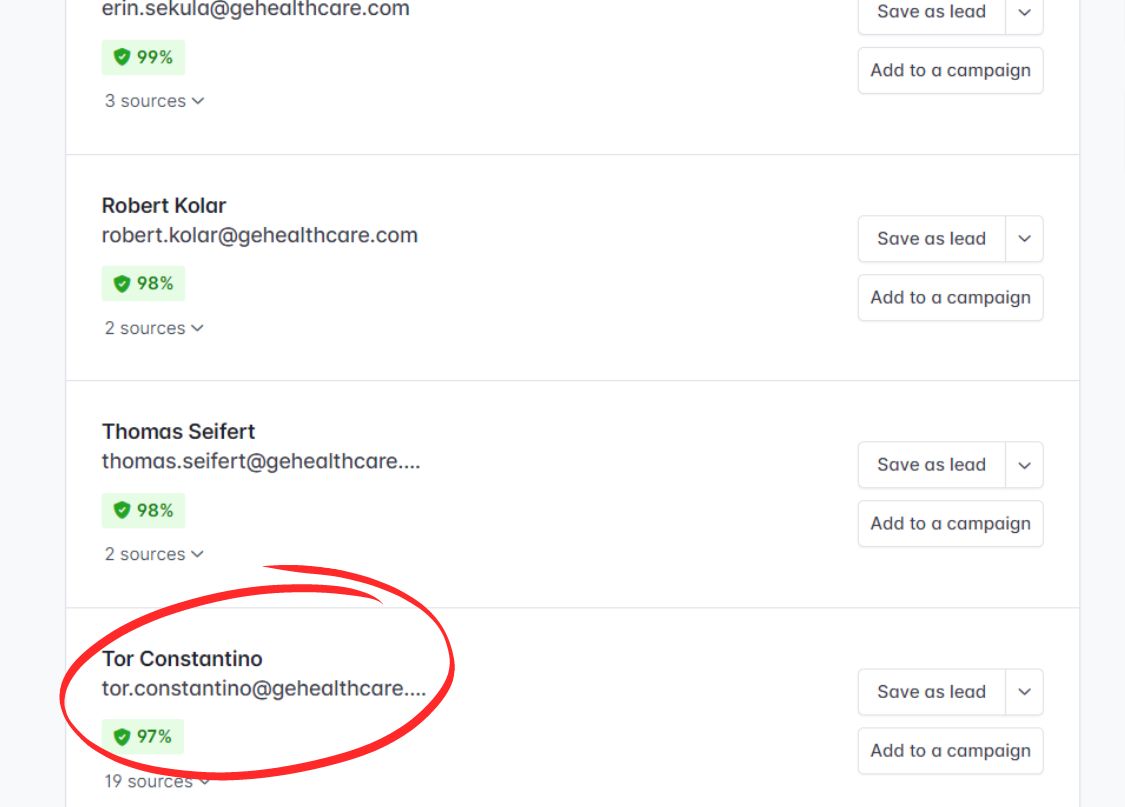
Now, you’ve got the magic formula. With Tor’s result, and by checking the other top email addresses, you can see that GE HealthCare uses a firstname.lastname@gehealthcare.com email address. Therefore, it’s likely that if you emailed any employee there using that configuration, it would work. But it’s smart to put the odds even more in your favor with another search.
Cross-checking Hunter’s email addresses
Remember the cross-checking I recommended? It’s time for that step. You could search the GE HealthCare website for Jan’s email address, but it’s not listed. She’s in the C-suite, and executives aren’t keen on having their contact information floating around.
In this case, you can verify that the email configuration is accurate. Public companies and many privately held businesses list media contacts on dedicated pages or in press releases on their sites. At the bottom of a GE HealthCare press release, you can see the email address for Sara Pottle. This information confirms you’ve got the correct email configuration.
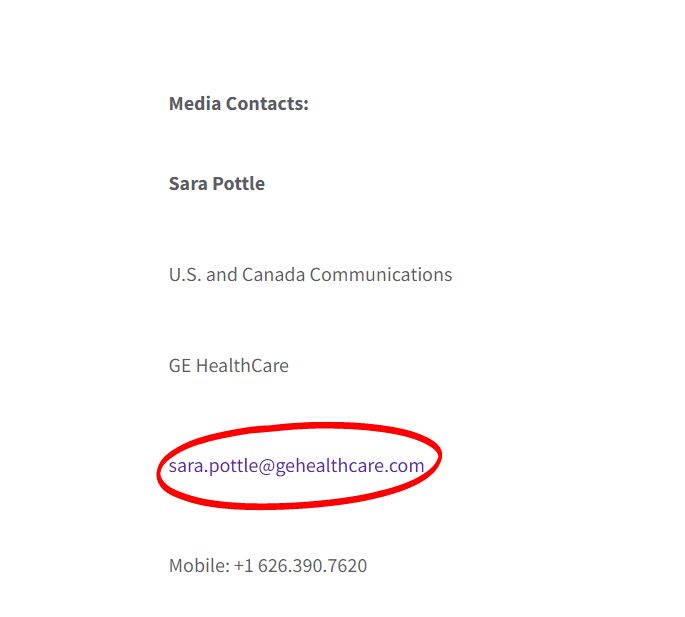
How to contact experts using LinkedIn InMail
InMail is a premium LinkedIn feature that allows you to message people who aren’t in your network. Depending on your subscription, you get between five and 150 InMail credits per month. If you’ve got the cheapest paid plan, you can burn through InMail messages quickly. That’s a key reason why email is a smart first option.
To send InMail, go to an expert’s profile. Let’s say you want to contact Barbara Thomas, a customer advocacy expert.
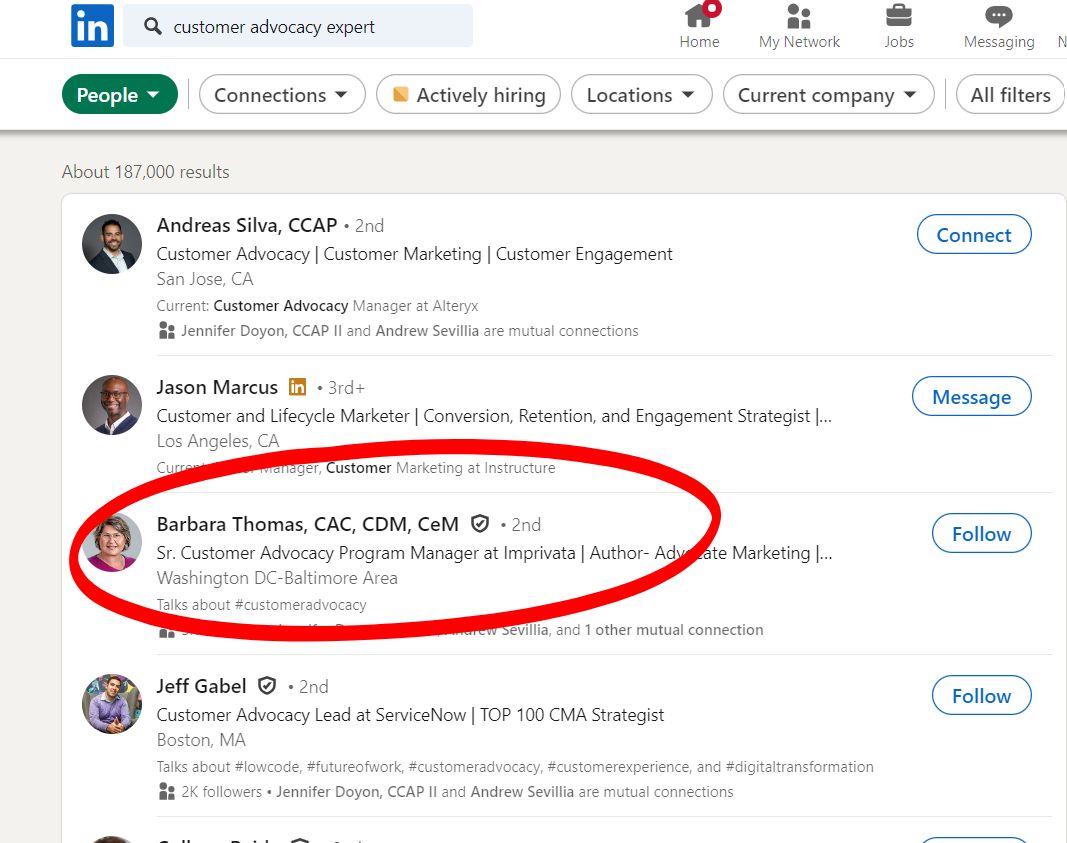
Click the “Message” button under her headshot and headline.
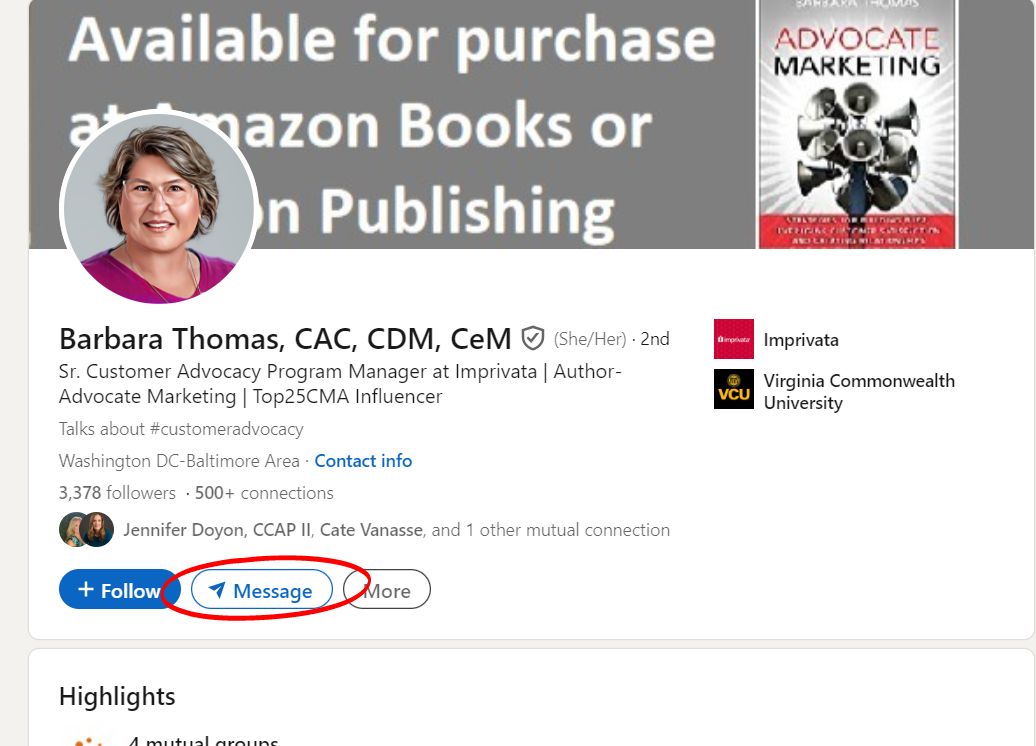
Next, write your message to Barbara in the InMail window and click the “Send” button. This will use one of your InMail credits.
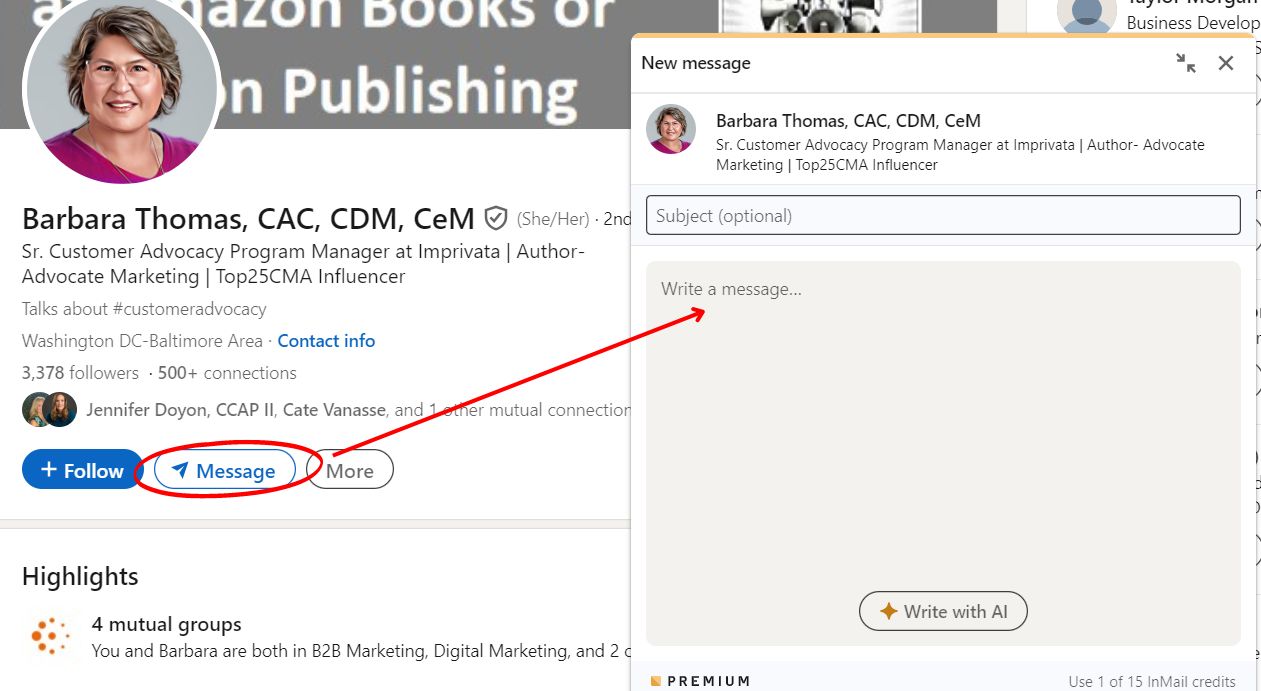
What to know before you contact external experts
Before you commit to searching for and contacting external experts, know that it can be challenging. It may require more time and patience that if you were to work with internal experts or customer advisory board members and advocates. Therefore, brace for extra research, extensive outreach, ghosting and rejections. The last thing you want is to be scrambling for help when you’re on a deadline.
Furthermore, before you reach out to them, you should know your topic enough to avoid asking “101” questions. Look for basic background online to become familiar with the content you’ll be working on. If your subject is highly technical, and you can’t find enough information in general Google searches, check out Google Scholar. It includes journal articles and academic papers, among other content. If you still come up short, visit your corporate or public library for additional resources.
Customize your help requests
No matter what type of experts you contact and how you contact them – whether through a third-party platform, email or LinkedIn InMail – be sure to customize your requests. Most importantly, be direct and succinct.
Tell them a little about your topic, your goals and how they can help. If you plan to interview them, let them know how much time you’ll need, the format (audio/video), what you’ll do with the content and your deadline. In addition, set expectations by sharing next steps.
Moreover, tell them how you’ll promote the content and how they can share it with their networks. Make it easy for them by providing links to the published content and social post copy with relevant hashtags.
If your interviews go well, but you need more help, ask them to recommend other subject experts they know. They might be willing into introduce you, which can speed up the process considerably.
Keep the conversation going
When you complete your project, be sure to send thank you notes to all of your experts. And ask if you can contact them about future projects. If they agree to help you, add them to your list of subject experts that you can reference the next time. You’ll have a ready-made database of experts at your fingertips.
Boost your brand’s credibility
Research shows that buyers crave and stick with brands they see as credible and trustworthy. By sharing experts’ insights with your current and prospective customers and helping them solve problems with fact-checked, vetted content, your brand will excel.



